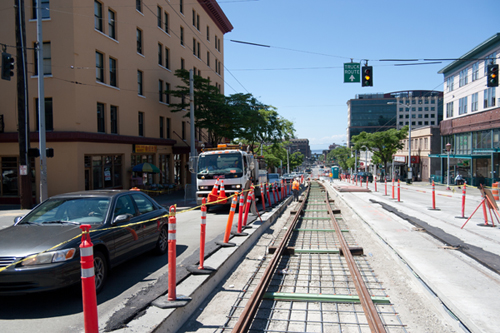By Charles Lam
Northwest Asian Weekly

The construction on Jackson has resulted in closed intersections, increased congestion, and lowered foot traffic. (Photo by Charles Lam/NWAW)
According to the city, the First Hill Streetcar was supposed to help the International District grow, but so far local businesses say the only thing it’s grown is the list of transportation-related issues that have slowed the neighborhood’s already sluggish economic recovery.
Combined with the elimination of King County Metro’s Ride Free Zone and the introduction of paid street parking, the construction on Jackson with its related power and water shutoffs, traffic congestion, and intersection closures has adversely affected business in the neighborhood.
“When you start looking at the actual impacts, it’s hard to tell whether they’re from the street car or because of other transportation issues, but the businesses around here have really complained about the drop in business,” said Maiko Winkler-Chin, the executive director of the Seattle Chinatown–International District Public Development Authority (SCIDpda), an organization that works to preserve and develop the International District. “Some things we know are truly because of the streetcar construction — the impact of the power and water shutoffs, the confusion about walking down the street.”

Confusion regarding where to cross the street and reduced parking have been major issues for multiple businesses. (Photo by Charles Lam/NWAW)
Foot traffic, one of the main drivers of ID business, has been greatly hampered as streetcar construction has closed intersections on Jackson Street, a major thoroughfare for the International District. While the First Hill Street Car may bring new customers to the neighborhood once it’s finished, at the moment many feel like the construction is pushing people away.
“We’ve definitely felt an impact from the streetcar construction. Revenues are down compared to years past,” said Binko Chiong-Bisbee, who owns Kobo gallery with her husband. “It’s changed our foot traffic quite a bit. I think a lot of people avoid the neighborhood now. It’s even deterred the people who live and work in the International District from crossing Jackson because it’s not clear where they can turn or cross.”
Worse still, during the peak period of the neighborhood’s commercial activity — the two weekends leading up to Lunar New Year — the Department of Transportation closed two main intersections in the neighborhood, resulting in debilitating traffic congestion.
“There’s a couple of things that are different about this neighborhood, and one of them is the fact that Lunar New Year is so important,” Winkler-Chin said. “I think there was a miscommunication with the city about just how important this holiday is.”
In response to the complaints, the Seattle Department of Transportation (SDOT) has committed to not working on the First Hill Streetcar project in the International District during the two weekends before Lunar New Year in 2014.
However, a longer-term construction moratorium, much like the one that exists in Pioneer Square and the Central Retail District between Thanksgiving and Christmas, is an issue that requires legislative action, according to SDOT.
These effects can have a massive toll for a neighborhood that is only just recovering from the recession. The number of businesses in the International District has slowly been growing, from 377 at the peak of the 2007 recession to 395 in 2011, and 408 in 2012, according to the Metropolitan Improvement District’s Business Development and Market Research team.
In preparation for the construction, SDOT attempted to inform the community through multiple avenues. In addition to media notices, emails, and online postings, SDOT went door-to-door with notices and hosted informational booths at community festivals. SDOT even hosted its own information meetings at the Asian Resource Center and the Wing Luke on May 29 and 30 respectively.
There are also concerns that the construction is having an increased impact on the senior population, which makes up the majority of the people who live in the ID. According to Nielson Research, the median age of an ID resident in 2012 was 48.
“The construction has really made access to our services inconvenient and difficult,” said Teresita Batayola, CEO of International Community Health Services, which operates a clinic in the ID. “Our patients continue to come in because they need to see the doctor or dentist, get a mammogram, pick up a prescription, or participate in one of our classes. In that sense, the numbers seeking health care from us have not been negatively affected. However, the disruptions at Jackson, the ability to turn into 8th Ave S, and at times blockages in front of our clinic and the surrounding neighborhood have made it very difficult to find our parking and for our patients to cross the street.
The elderly have had a harder time because their mobility is more limited and crossing uneven steel plates or finding the temporary crosswalks are challenging for them.”
Construction on the First Hill Streetcar is slated to be finished in 2014. With increased cooperation from the city, businesses can only hope to make it though another year.
“There’s a lot of businesses in this neighborhood that’re very strong, and they’re not openly complaining,” said Winkler-Chin. “But we still need to get through this for another year, because it’s going to be another full year.” (end)
Charles Lam can be reached at charles@nwasianweekly.com.



